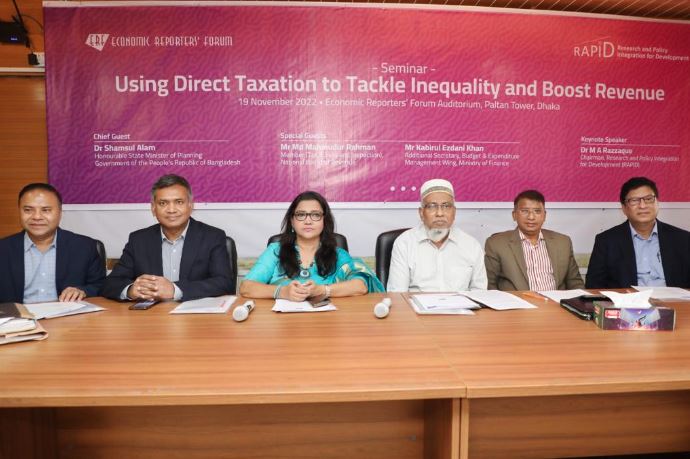
DHAKA, Nov 19, 2022 (BSS) - Speakers at a seminar today said that revenue collection from individual income tax could be increased to 3.1 percent of GDP from the current level of one percent if all the eligible individuals pay taxes according to their income tax slabs.
They also noted that in order to reduce the inequality, direct tax measures should be increased and that should be the main way forward.
For this, they said the number of registered taxpayers should be increased.
Apart from this, if the tax exemption facility is excluded, it will be possible to increase it to 2 percent of GDP.
They made such observations at a seminar titled "Using Direct Taxation to Tackling Inequality and Boost Revenue" jointly organized by the Research and Policy Integration for Development (RAPID) and the Economic Reporters Forum (ERF) held at the ERF office in the Capital's Paltan area.
Rapid chairman Dr. Mohammad Abdur Razzaque presented the keynote in the seminar. He said that Bangladesh's tax to GDP ratio is 9 percent, which is the lowest in the world.
"The main reason for this is the less proportion of direct tax. It should be increased. Currently there is 65 percent indirect tax and 35 percent direct tax. However, the government has taken the initiative to increase the direct tax to 70 percent and reducing the indirect taxes to 30 percent," he added.
Dr Razzaque pointed out that inequality and low government spending (budget) as a share of GDP is the major problem in the country.
"The main reason for this is the low proportion of direct tax. Although the amount of direct tax is increasing but in terms of GDP ratio, it is still the lowest compared to other countries of the world," he said.
The revenue income from direct tax of many countries in the world like India, Bhutan and Malaysia is higher than Bangladesh.
The Rapid Chairman said, "If we want to achieve the targets of higher growth and becoming a developed country, revenue collection as a proportion of GDP should be increased to 17 percent by 2030 and 21 percent by 2041."
He said a significant part of it must come from the direct tax. Razzaque noted that the tax net is very low, but the tax identification number (TIN) holders are 7.6 million while only 2.4 million out of those submit their returns.
Besides, he suggested that the government should increase the tax-free income of individual tax payers because of the high inflationary pressure.
Turning to the corporate tax, he cited that the ratio of corporate tax is only 1.4 percent of GDP. "Currently there are 2.73 lakh registered companies. Of these, only 11 percent or about 30,000 companies pay tax."
Former Chairman of NBR Dr Nasir Uddin Ahmed said that the new target to increase direct tax is an ambitious target. "The government should give a time frame to achieve the target."
He also suggested that this target should be 50 percent instead of 70 percent.
Due to political economy, Dr Nasir said the NBR is lagging behind to increase potential revenue income as many sectors are getting tax holidays and special tax rebates.
"Moreover, many of the members of parliament are businessmen and they also want to take advantage of the tax exemption. Due to these reasons, Taka 2.5 lakh crores of tax was lost by the NBR in the last financial year." he added.
Additional Secretary of Finance Ministry Kabirul Ezdani Khan agreed with the speakers that the amount of the country's national budget is small in proportion to GDP compared to other countries. "Despite the high revenue potential, the tax to GDP ratio is very low," he added.
He also pointed out that in many areas like real state and new business like Facebook, Amazon, Foodpanda in online platform, the government has lost expected revenue.
To increase revenue income, Dr Nasir suggested that a major solution to this should be that the tax collection procedure is made automated as well as establishing a taxpayer service wing of the NBR.
Rapid executive director Dr. M Abu Yusuf moderated the seminar while NBR member Mahmudur Rahman, ERF president Sharmeen Rinvy and its general secretary SM Rashidul Islam were present, among others, at the seminar.